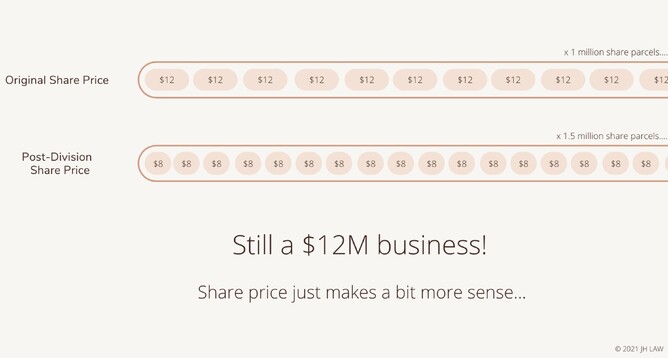Long answer short, it’s when you want a more appropriate and comparable share price to others in your industry.
It's about managing investor perceptions!
For investors to see and compare share prices across competing equity offers from businesses in the same industry.
Example: 🍊
Let's say that we have JH Oranges Limited (example company) and it's worth $12 million dollars (a.k.a market capitalisation). It currently has 1 million shares on issue, meaning that the shares are currently worth $12 each.
However, we see that in a few towns over, Sweet Oranges Limited and ABC Oranges Limited (more example companies) are both offering (and appear to be successfully getting positive analyst and media traction) their shares between $7 - $9 each.
Given that JH Oranges also wants to raise through equity, we might think:
"Hmm, if I don't lower my share price my business could appear over-valued and I might lose the interest of potential investors to others".
Note! Consolidation or subdivision of shares does not change the market cap of a business.
Upon a valuation exercise, we decide to reduce our share price to a more reasonable $8 per share (whilst maintaining our market cap of $12M) which means we would need to subdivide our existing 1 million shares into 1.5 million shares.
Legally, how does its work?
Companies Act 1993: Rarely speaks of shares consolidation or subdivision, although section 48 does record an exemption from directors having the same considerations for a typical share issue (i.e. shareholder approval, fair value of shares, resolutions & certifications).
Constitution: Given this document is publicly searchable, interested investors can themselves check out how the board would go about any share consolidation or subdivision (i.e. with or without shareholder approval) and any subsequent share issue to other persons (i.e. future investors).
Update Register: Don’t forget that any change in the total number of shares must be notified to the Companies Office website within 10 working days.
Why is the share price important?
Attract the attention of high value investors (and their analysts)! They’ll have tried and true methods of assessing companies to assess a business' prospect for long term profitability.
Share price is just one (albeit, eye-catching!) factor of a company. You would expect prudent investors to consider all factors, including the review of rights and obligations attached to their proposed purchase of shares.
Please reach out to Janey at janey@jhlaw.nz if you have any questions regarding the above. The above is purely for informational purposes, where JH LAW will need to determine if the above information is applicable or appropriate to your particular situation.


